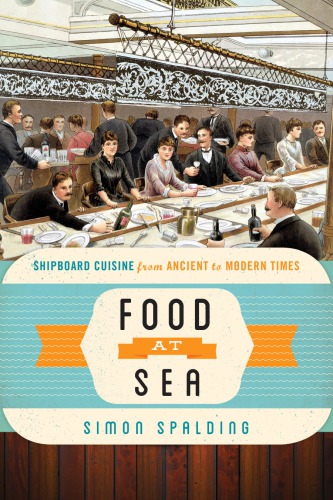
Food at Sea
Shipboard Cuisine from Ancient to Modern Times
کتاب های مرتبط
- اطلاعات
- نقد و بررسی
- دیدگاه کاربران
نقد و بررسی

January 1, 2015
Maritime musician Spalding's first book provides details of the preservation, preparation, and consumption of food at sea throughout time and as technology progressed. Subjects covered include the ancient and medieval periods, the age of exploration, navies, merchant trade, immigrant and slave ships, steam power, the effects of canned foods on sea travel, ocean liners, refrigeration, and such "new" technologies as submarines, cruise ships, and containerization. The author covers much ground and every corner of the globe yet never ceases to be intimate, identifiable, and fascinating, nor slows his clip. Much of which is owed to the perfectly apportioned breakdown within chapters, the perfectly concise text, and most of all, by the lovely accoutrements--the menus, recipes, charts, illustrations, poems, quotes, and ration lists. Never have so many reference sources been so palatably presented. VERDICT Highly recommended for anyone with an interest in the effects of food on human history.--Benjamin Malczewski, Toledo-Lucas Cty. P.L.
Copyright 2015 Library Journal, LLC Used with permission.

February 16, 2015
Spalding, a scholar and sailor who has worked and cooked at sea, posits in the introduction to this academic work on how food was prepared on ships from the Viking age to the Titanic. The slender volume manages to cover the entirety of human history at sea. Spalding's tone is dry, but readers hungry for eccentric facts about cooking and eating in the ocean may delight in its specificities: a chart detailing rations of pork and beans and bully beef during the Civil War, the Gala Dinner Menu from aboard the S.S. United States (Foie Gras in aspic, Kangaroo Tail soup), and how canned salmon came to replace salt cod with the advent of canning. The book's standout section, however, is the chapter devoted to immigrant and slave ships, which describes meals given to slaves in the Middle Passage, opening up a larger discussion of conditions and life on these ships. Immigrant families were forced to share a stove, each family expected "to prepare its own food." The book concludes with several as sample recipes throughout time B&W Photo.

























دیدگاه کاربران